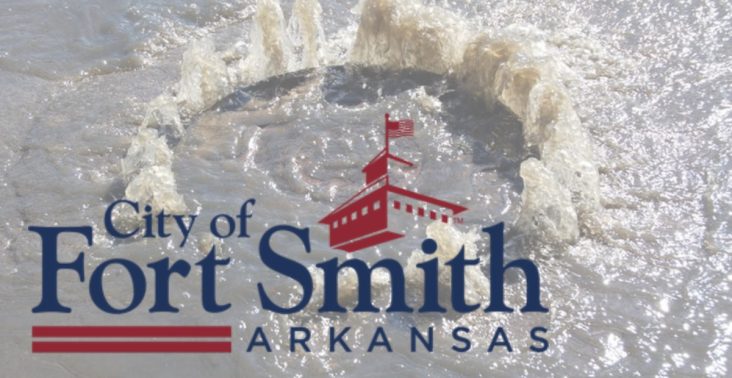‘Complicated’ 10-year consent decree plan on the Fort Smith Board agenda
by February 9, 2025 11:02 am 1,309 views

Discussion of three criteria needed to keep the City of Fort Smith in compliance with a federal consent decree is on the agenda for the Board of Directors study session Tuesday (Feb. 11). Part of the discussion will include a May 13 special election.
The board in November approved a 10-year financial plan for administration to forward to the U.S. Department of Justice (DOJ) and U.S. Environmental Protection Agency (EPA) that detailed how the city can achieve compliance with the consent decree if it is granted a proposed 10-year extension of the consent decree.
After decades of failing to maintain water and sewer infrastructure to federal standards, the city entered into a consent decree with the EPA and DOJ in late 2014. The consent decree, which began in January 2015, required the city to make an estimated $480 million worth of sewer upgrades in 12 years. That amount is now estimated to be as high as $800 million. The city has asked for more time, citing a variety of factors.
There are three essential financial elements to the city’s 10-year financial plan that the board must consider immediately, Interim City Administrator Jeff Dingman said in a memo to the mayor and directors.
The first is the adoption of 3.5% increases to the sanitary sewer rate starting June 1, then an additional 3.5% increase Jan. 1, 2026, and each Jan. 1 through 2030. A public hearing was held regarding the increase Feb. 4.
The ordinance to raise rates is ready for consideration on Feb. 18, Dingman said.
The next step in the plan will need to be the issuance of sales and use tax bonds starting in 2025 to fund the first $360 million in consent decree/sanitary sewer capital project obligations, as identified in the adopted consent decree capital improvement plan, Dingman said. The renewal and reauthorization of the city’s sales taxes is needed so that sales tax proceeds to fund the bonds needed for the capital improvements identified in the consent decree plan is the final step, Dingman said.
The city has 2 cents in local sales tax that have been approved by the voters.
“The first penny is dedicated to streets, bridges, and associated storm drainage. The second penny is allocated 25% to parks and fire, split evenly, and then 75% allocated to the police department (equivalent to 1/8-cent) and to the funding of consent decree projects (equivalent to 5/8-cent),” Dingman said in the memo.
The financial plan calls for the city to ask voters to approve reauthorizing this last component of 75% just the same as it is, but allow the 5/8 piece of it for consent decree projects to be used to fund debt service for the $360 million in sales and use tax bonds. The plan also states that the city ask voters to reauthorize the 1-cent sales and use tax for streets/bridges/drainage, then divert 3/8 of that 1 cent to also be used to fund debt services for the sales and use tax bonds, the memo states.
Following is how the sales taxes would be used if all parts of the plan are approved.
• The 0.13% of sales tax tagged for parks capital projects would remain as is.
• The 0.13% of the sales tax dedicated to the fire department for personnel and capital expenditures would stay the same.
• The 0.13% of the sales tax dedicated to the police department for personnel and capital expenditures would be reauthorized to stay with the police department.
• The 0.63% of the sales tax dedicated to consent decree projects would be renewed at 1% and redistributed to fund debt service for consent decree projects.
• The 1% of the sales tax dedicated to streets, bridges, and drainage would be renewed at 0.63%.
The total local sales tax would remain at 2% with distribution just slightly different.
“If voters approve this adjustment, they will have authorized a total of 1% sales and use tax for issuing bonds to address consent decree projects; and 5/8-cent for streets/bridges/drainage projects; and 1/8-cent each for police, fire, and parks,” Dingman said, noting the overall sales tax on goods and services purchased in Fort Smith would remain at 9.5%.
The board of directors would have to approve taking all measures to the citizens in an election. All ordinances and resolutions would have to be adopted and submitted to the Sebastian County Election Commission before March 4 for a May 13 special election ballot.
“This is obviously a complicated proposal, but the end result of prioritizing the city’s consent decree obligations backed by one full percent of our local sales tax is the main objective of this process,” Dingman said.
